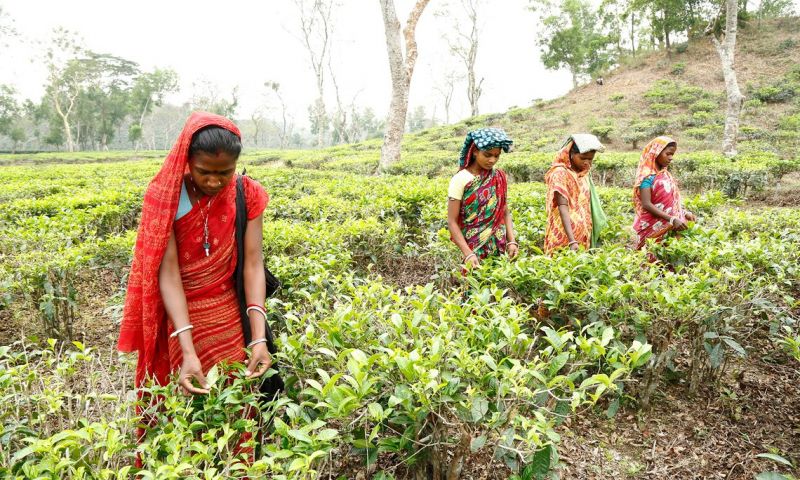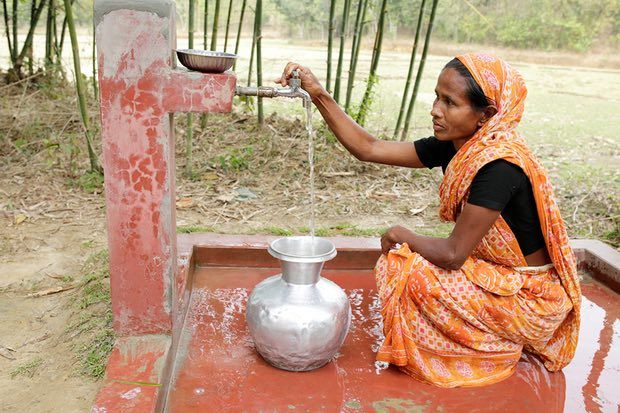Clean Water Transforms Lives of Tea Pickers in Bangladesh
Published on by Water Network Research, Official research team of The Water Network in Social
Poor sanitation meant Surma valley workers and their families were often sick, but a hygiene project has brought them a healthy water supply and safe toilets.

Women pick tea at the Gulni tea estate near Sylhet, northern Bangladesh. Photographs: Abir Abdullah/WaterAid
Bina Patru is unsure of her age. She thinks she is in her mid-40s, but knows that she has spent a lifetime toiling in the tea bushes that carpet the rolling hills of the Surma valley of northern Bangladesh.
Isolated by geography, as well as by their Hindu culture in the predominantly Muslim country, Bangladesh’s tea pickers are among the most excluded and marginalised communities, earning 85 taka (barely $1) for a day of back-breaking work.
Until recently, notable among the privations has been the lack of access to safe water, toilets and the basics of sanitation and hygiene on estates such as Gulni, where Bina picks tea, a 90-minute drive from the thriving provincial capital of Sylhet.
Open defecation was widespread, near the same streams that provide water for washing and cleaning, and waterborne illnesses were common, particularly among the most vulnerable – young and old.
But now, on a dirt track that cuts through the tea estate, is a simple new standpipe on a cement base, delivering plentiful fresh water.
In a bamboo shack nearby, a clean latrine has been installed to be shared by residents who used to have to walk into the bushes to go to the toilet. At the estate primary school, children are taught how to wash their hands and then to relay the same message about hygiene at home.
These simple innovations – introduced by WaterAid and its local Sylhet partners – have transformed lives.

Bina Patrou , a tea picker at the Gulni tea estate, collects water from a pump installed by WaterAid and local partners
“These pumps and latrines have made such a difference for us,” says Bina. “We used to have to walk more than half-an-hour each way to collect water from a well. We’d do that journey in the rain and the heat, walk with one jug on our heads, another on our hip.
“Water for everything else came from the streams. People had to go the toilet in the bushes and some went near the same streams.
“I used to miss days at work because of illness and so I wasn’t paid. Our children were often sick – my daughters suffered from diarrhoea and dysentery when they were growing up – and sometimes I had to look after them rather than work.”
Bangladesh has around 165 tea gardens, employing about 400,000 people, growing, harvesting and processing tea for the thirsty domestic market.
To launch the pilot project, WaterAid and its partners had to overcome the opposition of tea estates managers and owners. The estates had long blocked any access for NGOs, suspecting that they would try to organise workers and advocate for their rights. But the breakthrough eventually came after long negotiations by WaterAid’s partner, the Institute of Development Affairs (Idea), to introduce water, sanitation and hygiene (Wash) programmes.
Unsurprisingly, it was the economic argument – that a healthy worker is more efficient and productive – that finally won the day with the bosses.
The pilot project started in 2010 in four tea gardens where less than 4% of workers and their families had access to good sanitation, according to an Idea assessment. By 2012, other estate managers were asking them to come in and provide services too. The project, funded by the HSBC Water Programme, has now covered 14 gardens and 33,000 people.
Read more at: The Guardian
Media
Taxonomy
- Public Health
- Water Access
- Water & Sanitation
- Gender Rights
- Empowerment & Right To Water
- Sanitation & Hygiene
- Water sanitation
- Water Sanitation & Hygiene (WASH)